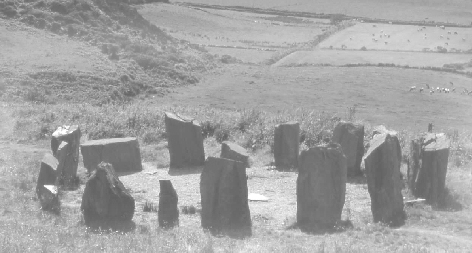From Abracadabra to Zombies | View All
druid
The druids were the "wise men" of the Celts. Although dozens of books have been written about them, almost nothing is known about the druids. Their beliefs were esoteric and passed on orally. Their practices, for the most part, were not public. With no written tradition and no major temples where art might provide a key to some of the druids' activities, we must rely upon the words and speculations of foreign observers.

The druids are mentioned by the ancient Roman authors Strabo, Diodorus, Posidonius and Julius Caesar, who portray them as overseeing bloody religious rituals. Hence, the druids are often thought of as having primarily a religious function and are often called 'priests.' Diodorus calls them 'philosophers.' Strabo calls them bards and soothsayers with a reputation for mediation. Whatever they were, the druids enjoyed a position of high status in Celtic society very unlike the position of modern "druids" who find solace communing with grass or the wind while parading around stone circles.
Modern "druids" treat Stonehenge and other megalithic monuments of the British Isles as places of worship. All of the stone circles, menhirs, dolmens, etc., of the British Isles were constructed by peoples who antedated the Celts by one to three thousand years. Stonehenge, for example, was built over a period of centuries, from 2800 BC to 1550 BC. The Celts did not arrive in the British Isles until long after the great megaliths had been erected.
It seems likely that the Celtic druids were a class apart from the warriors in Celtic society. "They served the tribes and clans as judges, prophets, soothsayers, wise men and as keepers of the collective memory" (Herm, 61). They were the intellectuals in a warrior society and have been compared to the Brahmins of the Indian caste system.
The word 'druid' is thought to derive from the Greek drus (oak) and the Indo-European wid (wisdom), "which produces the apparent absurdity of 'oak-knower' (Herm, 57). In any case, druids are typically associated with oak trees. Some say they held assemblies in sacred groves, that they prized the mistletoe growing on the oaks, or that they worshipped the trees themselves. However, the modern druids' nature worship is a fanciful connection to the ancient Celts. Finally, there is no direct historical connection between the Celtic druids and modern Wicca.
further reading
books and articles
Delaney, Frank. The Celts (3 video tapes).
Ellis, Peter Berresford. The Druids (Wm. B. Eeerdmans Publishing Co.;1998).
Herm, Gerhard. The Celts (St. Martin's Press: New York 1977).
'O. Hogain, Daithi. The Sacred Isle: Pre-Christian Religions in Ireland (Boydell & Brewer, 1999).
websites
Dalriada Celtic Heritage Society: Who Were the Celts?
news
Druidry to be classed as religion by Charity Commission The Druid Network's charitable status entitles it to tax breaks, but the organisation says it does not earn enough to benefit from this.


